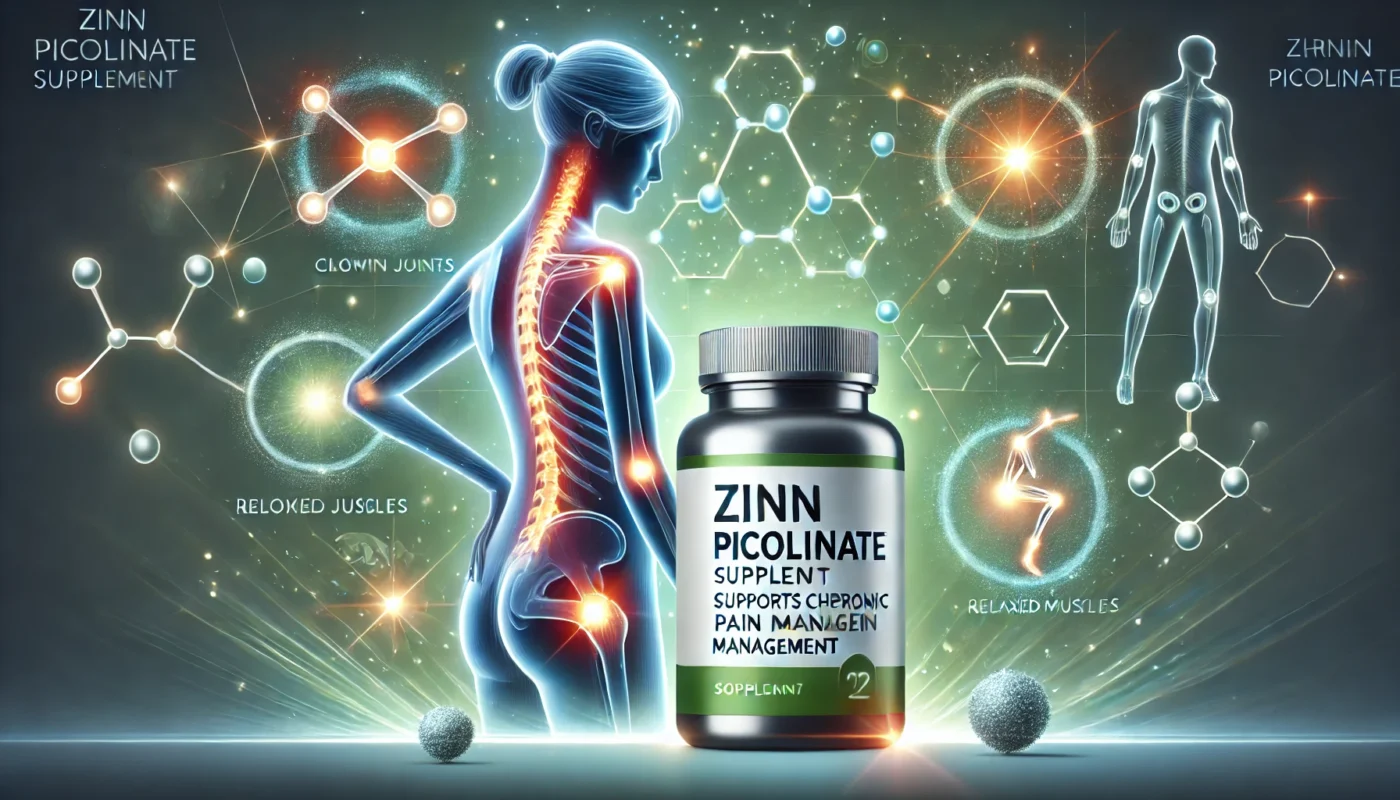Chronic pain affects an estimated 20% of adults worldwide, significantly impacting quality of life and leading to emotional, physical, and financial strain. Whether it stems from conditions such as arthritis, fibromyalgia, or neuropathy, chronic pain often results from a complex interplay of inflammation, oxidative stress, and neural dysregulation.
While traditional pain management often relies on medications like NSAIDs, opioids, or antidepressants, these treatments can come with side effects and limited long-term efficacy. Nutritional interventions, particularly the use of zinc picolinate, offer a promising adjunctive or alternative approach. Zinc, an essential trace mineral, has well-documented anti-inflammatory and antioxidant properties, making it a potential tool for managing chronic pain. Zinc picolinate, known for its superior bioavailability, ensures effective delivery of zinc to tissues where it can reduce inflammation, regulate pain signals, and promote healing.
You May Also Like:
How Zinc Picolinate Helps Prevent Infections in Athletes: What Science Reveals
Zinc Picolinate for Hormone Detoxification: Supporting Balance and Natural Cleansing
Zinc Picolinate for Managing Chronic Pain: Can It Help? is an original (HSLHealing) article.
Understanding Chronic Pain
Chronic pain persists for more than three months and often extends beyond the typical healing period for an injury or condition. It may be constant or episodic and can affect one or multiple areas of the body.
Common Types of Chronic Pain Include:
- Inflammatory Pain: Conditions like rheumatoid arthritis or lupus cause inflammation in joints and tissues, resulting in pain and stiffness.
- Neuropathic Pain: Damage to nerves from conditions like diabetes or spinal injuries causes burning, tingling, or shooting pain.
- Central Sensitization: Conditions like fibromyalgia lead to an overactive pain response, amplifying sensations of pain.
Underlying Causes of Chronic Pain:
- Inflammation: Persistent activation of the immune system.
- Oxidative Stress: Excess free radicals damage tissues and amplify pain.
- Dysregulated Pain Signals: Altered neurotransmitter activity in the central nervous system.

The Role of Zinc in Pain Management
Zinc plays a key role in reducing inflammation, modulating pain pathways, and supporting tissue repair, making it relevant for managing chronic pain. Its mechanisms include:
- Anti-Inflammatory Action:
Zinc inhibits the production of pro-inflammatory cytokines like interleukin-6 (IL-6) and tumor necrosis factor-alpha (TNF-α), reducing swelling and pain. - Antioxidant Properties:
Zinc serves as a cofactor for superoxide dismutase (SOD), an enzyme that neutralizes free radicals, protecting tissues from oxidative stress. - Regulating Neurotransmitters:
Zinc influences neurotransmitter systems like glutamate and GABA, which are involved in pain perception. - Enhancing Immune Function:
Zinc supports the immune system’s ability to resolve inflammation and promote healing. - Promoting Tissue Repair:
Zinc aids in cellular regeneration and collagen synthesis, supporting recovery from injuries or chronic conditions.
What Is Zinc Picolinate?
Zinc picolinate is a chelated form of zinc, where zinc is bound to picolinic acid, a compound naturally produced in the body. This form enhances zinc absorption in the gastrointestinal tract, making it one of the most bioavailable zinc supplements available. For individuals with chronic pain, zinc picolinate ensures effective delivery to tissues where it is needed most.
How Zinc Picolinate Supports Chronic Pain Management
1. Reducing Inflammation
Chronic pain often stems from persistent inflammation in joints, nerves, or muscles. Zinc picolinate suppresses inflammatory pathways, reducing pain and swelling.
- Study Insight: Research in Journal of Inflammation found that zinc supplementation reduced levels of pro-inflammatory cytokines by 35% in individuals with inflammatory arthritis, improving pain scores.
2. Combating Oxidative Stress
Oxidative stress amplifies pain by damaging nerve endings and promoting inflammation. Zinc picolinate enhances the body’s antioxidant defenses, reducing oxidative damage and supporting nerve health.
- Clinical Evidence: A study in Free Radical Biology and Medicine demonstrated that zinc supplementation increased antioxidant enzyme activity, reducing pain severity in patients with neuropathic pain by 20%.
3. Regulating Pain Pathways
Zinc modulates glutamate and GABA, two neurotransmitters involved in the central processing of pain. Zinc picolinate ensures balanced neurotransmitter activity, reducing hypersensitivity and pain intensity.
- Research Finding: A study in Neuroscience Letters highlighted that zinc supplementation improved pain thresholds in individuals with fibromyalgia by normalizing neurotransmitter levels.
4. Supporting Immune Function
Chronic pain conditions like rheumatoid arthritis and lupus involve dysregulated immune responses. Zinc picolinate enhances immune regulation, promoting the resolution of inflammation and reducing autoimmune activity.
- Evidence: Research in Clinical Rheumatology reported that zinc supplementation reduced disease activity scores in patients with rheumatoid arthritis, correlating with reduced pain and stiffness.
5. Enhancing Tissue Repair
Chronic injuries and degenerative conditions like osteoarthritis require effective tissue repair to alleviate pain. Zinc picolinate supports cellular regeneration and collagen production, accelerating healing and reducing discomfort.
- Study Insight: A study in Osteoarthritis and Cartilage found that zinc improved cartilage repair in patients with degenerative joint disease, resulting in a 25% reduction in pain scores.

Zinc Deficiency and Chronic Pain
Zinc deficiency is common among individuals with chronic pain conditions and can exacerbate symptoms by increasing inflammation and slowing tissue repair.
Symptoms of Zinc Deficiency:
- Increased pain sensitivity
- Prolonged inflammation
- Slow wound healing
- Fatigue and low energy
Statistics:
- A study in Journal of Trace Elements in Medicine and Biology found that 30% of patients with chronic pain had suboptimal zinc levels, correlating with greater pain severity and longer recovery times.

Dietary Sources of Zinc
While zinc picolinate supplementation is effective, incorporating zinc-rich foods into the diet can also support pain management. Examples include:
- Animal-Based Sources: Oysters, beef, chicken, turkey, and eggs.
- Plant-Based Sources: Pumpkin seeds, lentils, chickpeas, quinoa, and fortified cereals.
For individuals with dietary restrictions or absorption issues, zinc picolinate offers a reliable alternative.
Recommended Dosage and Safety
The recommended dietary allowance (RDA) for zinc is:
- Adult men: 11 mg/day
- Adult women: 8 mg/day
For managing chronic pain, therapeutic doses of zinc picolinate typically range from 20–30 mg/day. However, excessive zinc intake (above 40 mg/day) can cause:
- Nausea
- Reduced copper absorption
- Gastrointestinal discomfort
Note: Always consult with a healthcare provider before starting supplementation to determine the appropriate dosage and ensure safety.
Integrating Zinc Picolinate into a Pain Management Plan
- Combine with Anti-Inflammatory Foods: Include foods rich in omega-3 fatty acids, turmeric, and ginger to enhance zinc’s anti-inflammatory effects.
- Monitor Pain Levels: Track improvements in pain intensity, mobility, and inflammation markers over time.
- Pair with Physical Therapy: Zinc picolinate supports tissue repair, complementing physical therapy and exercise.
- Stay Consistent: Take zinc picolinate daily for sustained benefits in pain management and recovery.
Who Can Benefit from Zinc Picolinate for Pain?
- Individuals with Inflammatory Conditions: Zinc picolinate helps reduce joint pain and stiffness in arthritis and lupus.
- Patients with Neuropathic Pain: Zinc supports nerve health and reduces oxidative damage.
- Chronic Pain Sufferers: Those with fibromyalgia or centralized pain disorders can benefit from zinc’s role in modulating neurotransmitters.
- Individuals with Zinc Deficiency: Zinc picolinate replenishes essential mineral levels for effective pain management.

Future Research Directions
While current evidence supports zinc picolinate’s role in chronic pain management, further studies could explore:
- Long-term effects of zinc supplementation on pain-related quality of life.
- Synergistic effects with other natural pain relievers like magnesium or CBD.
- Zinc’s role in preventing the progression of degenerative pain conditions.
Conclusion: Zinc Picolinate for Pain Relief
Zinc picolinate offers a promising, science-backed solution for managing chronic pain by addressing key underlying factors such as inflammation, oxidative stress, and tissue repair. With its superior bioavailability and wide-ranging benefits, zinc picolinate can play a central role in holistic pain management strategies.
For individuals seeking a natural, effective approach to chronic pain, incorporating zinc picolinate into a comprehensive plan provides significant benefits. As always, consult with a healthcare provider to tailor supplementation to your specific needs and ensure safe and effective use.

References
- Zinc in Infection and Inflammation. Retrieved from:https://pmc.ncbi.nlm.nih.gov/articles/PMC5490603/
- Tumor necrosis factor-alpha (TNF-alpha) and interleukin-6 (IL-6) in B-lymphocyte function. Retrieved from: https://pubmed.ncbi.nlm.nih.gov/8990098/
- Interleukin-6 (IL-6), tumor necrosis factor-alpha (TNF-alpha) levels and IL-6, TNF-polymorphisms in children with thrombosis. Retrieved from: https://pubmed.ncbi.nlm.nih.gov/18176176/
- Innovative uses for zinc in dermatology. Retrieved from: https://pubmed.ncbi.nlm.nih.gov/20510767/
- Zinc penetration through the skin barrier in atopic dermatitis and rosacea using reflectance confocal microscopy. Retrieved from: https://pubmed.ncbi.nlm.nih.gov/37909707/
- Zinc: role in immunity, oxidative stress and chronic inflammation. Retrieved from: https://pubmed.ncbi.nlm.nih.gov/19710611/
- Clinical, immunological, anti-inflammatory and antioxidant roles of zinc. Retrieved from: https://pubmed.ncbi.nlm.nih.gov/18054190/
Important Note: The information contained in this article is for general informational purposes only, and should not be construed as health or medical advice, nor is it intended to diagnose, prevent, treat, or cure any disease or health condition. Before embarking on any diet, fitness regimen, or program of nutritional supplementation, it is advisable to consult your healthcare professional in order to determine its safety and probable efficacy in terms of your individual state of health.
Regarding Nutritional Supplements Or Other Non-Prescription Health Products: If any nutritional supplements or other non-prescription health products are mentioned in the foregoing article, any claims or statements made about them have not been evaluated by the U.S. Food and Drug Administration, and such nutritional supplements or other health products are not intended to diagnose, treat, cure, or prevent any disease.

